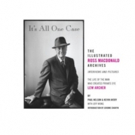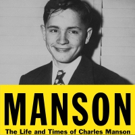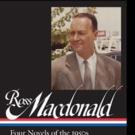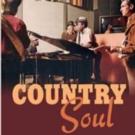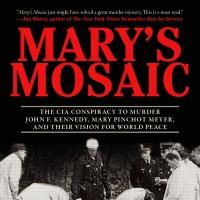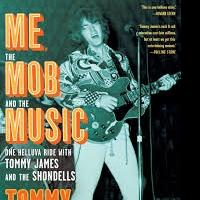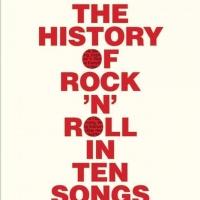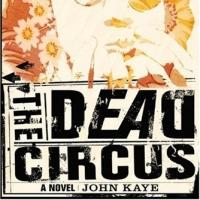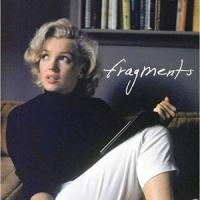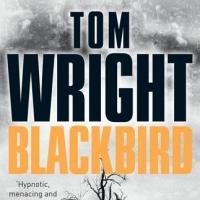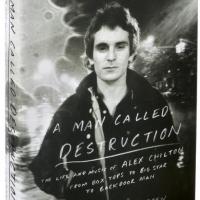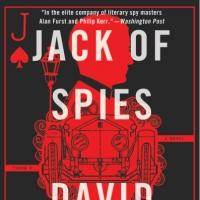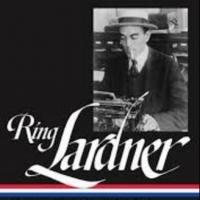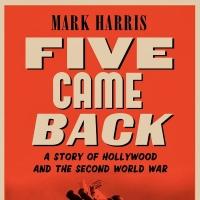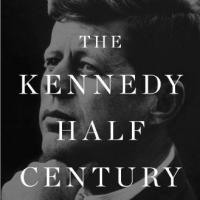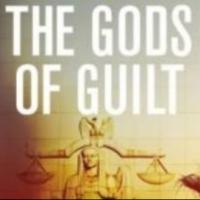John Walker Ross
John blogs about Pop Culture, his shady past and other life-affirming things at theroundplaceinthemiddle.com.
MOST POPULAR ARTICLES
December 12, 2016
It's All One Case: The Illustrated Ross Macdonald Archives is the latest effort in the recent renaissance of the reputation of the mid-century detective writer who was born Kenneth Millar.
May 3, 2016
When a culture critic is as prolific and well known as Greil Marcus, and has written books as revered as Mystery Train and Lipstick Traces, it's a mouthful to say any one book defines him
December 4, 2015
The latest benefit to readers in the stage of enlightenment exemplified by the Library of America's expanding coverage of post-war pulp is the new two-volume collection devoted to Women Crime Writers, the first of which covers the 1940s
October 19, 2015
In fiction or life, I generally turn a cold shoulder to studies in psychopathy. I make a sort of exception for the subject of Charles Manson. Apparently I'm not alone.
August 18, 2015
Remarking on the distinction between English drawing room mysteries and America's hard-boiled crime dramas, Raymond Chandler famously wrote that his role model, Dashiell Hammett, “gave murder back to the kind of people that commit it for reasons, not just to provide a corpse.”
May 13, 2015
Charles Hughes' Country Soul: Making Music and Making Race in the American South, starts with some serious limitations.
April 13, 2015
Mary's Mosaic. It's an odd name for a Kennedy assassination tome so it bears explanation.
February 6, 2015
Me, the Mob and the Music is the autobiography of sixties' hit-maker Tommy James (as told to Martin Fitzpatrick).
December 31, 2014
Among the heavy hitters in the history of American crime fiction, the late Elmore Leonard was something of a 'tweener': not quite as purely entertaining as Donald Westlake, not as morally serious as Patricia Highsmith or Ross MacDonald, not as stylistically interesting as Raymond Chandler or as close to the no-nonsense bone as James M. Cain (who probably makes for the best comparison).
November 20, 2014
Greil Marcus has been a big-time rock critic for over forty years. I've been reading him for the last thirty-five....I've learned to take the good with the bad.
October 17, 2014
More than any other American city–even New York–Los Angeles occupies a psychic space as well as a geographic one. More than any other decade “the sixties” represents a state of mind as much as a series of dates in history.
September 12, 2014
The basic premise of Fragments–a collection of Marilyn Monroe's writings that ranges from bits of poetry and thoughts on psychoanalysis to rehearsed answers for upcoming interviews and favorite recipes (all complete with cross outs and noodlings)–is that the “mind of Marilyn” was, by definition, an interesting place to be.
July 25, 2014
The best thing about Blackbird, Tom Wright's second novel featuring a character named Jim Bonham (who almost nobody calls Jim), is the cover design, which is spare, evocative, compelling. Nothing's wasted there.
June 18, 2014
Holly George-Warren's A Man Called Destruction is the first full-length biography of Alex Chilton...
May 15, 2014
Despite its title and its almost documentary feel for period spy-craft, David Downing's Jack of Spies isn't necessarily bound by genre.
April 30, 2014
Some writers are valued for the window they provide into their own time, others for their prescience.
March 14, 2014
“But few of them would enter the war as these directors did, with the sense that, in impending middle age, they had found themselves with a new world to conquer, a task that would test their abilities to help win the hearts and minds of the American people under the hardest imaginable circumstances, with the greatest possible stakes.” Mark Harris.
February 20, 2014
The fiftieth anniversary of John Kennedy's assassination last November turned up an avalanche of books seeking to present new angles or re-hash old ones. Larry Sabato's The Kennedy Half-Century does a bit of both. Those who read Kennedy literature basically break down in three camps: obsessives (about the presidency, the assassination or both), neophytes (looking to get a handle on the basics) and tweeners (interested and reasonably astute about those basics but not on the verge of giving up their day jobs to learn more). I count myself a member of the third category. While I can't speak for how it would strike those who are a great deal more knowledgeable about the subject, for me, this was an easy and reasonably rewarding read. The book is broken down into three parts: Kennedy's life and presidency; his assassination; and his legacy. I'm not sure much new could be said on the first two matters and, for the most part–excepting a few tidbits on the assassination that amount to debunking-of-previous-debunkings-of-previous-debunkings and so on–Sabato makes no real attempt to give any substantially new perspectives or draw any rare conclusions. However, within the bounds of what he clearly did set out to do–i.e., give a summation of those aspects of Kennedy's life and death that would hold the attention of the general interest reader and provide an easy-access overview for at least some newcomers–he delivers very nicely. The really interesting and, I think, valuable part of the book is the last: a long and fairly detailed look at the effect Kennedy's legacy has had on his nine successors. This is still relatively fertile ground and, here, Sabato does come to some surprising conclusions and offers solid evidence to back his thesis. If you want to know why and how a conservative Republican like Ronald Reagan was able to channel Kennedy's aura and style more effectively than Lyndon Johnson (who was Kennedy's own vice-president), then this is a good primer on the subject. Same if you want to know how a good-old-boy policy wonk like Bill Clinton could effectively utilize the Kennedy brand–both as campaign style and governing substance–without having much of JFK's rhetorical wit (Kennedy was not exactly long-winded) or having overly warm relations with Senator Ted Kennedy, who was long-established as the family patriarch by the time Clinton reached the presidency. In addition, Sabato does a fine job of treading on some tricky ground regarding the “real” JFK who actually governed the country for two and half years, and the mythical JFK, whose shadow hung over subsequent issues from Viet Nam to Civil Rights to the Space Program to the basic arguments over the tax code. Turns out, virtually every president since 1963 has tried in some form or fashion to use the aura of the Kennedy mythology–and, in some cases, the assassination mythology as well–to advance his agenda. While some have been far better at it than others, Sabato makes it clear that none have turned down the opportunity to exploit the legacy when the opportunity arose. The books final third really turns on personalities then, but it avoids most of the common traps. I don't think there is anything here that strains credibility and that's a relief. The tendency to over-reach is all but endemic in the approach Sabato chooses, but–based on interviews I've seen with him and on the even more compelling evidence of the book itself–he seems to be inclined to stick to the facts. For instance, although Sabato seems to side with elite political and historical opinion which consistently tells us that the Bay of Pigs invasion was an unmitigated disaster, he also reminds us that the poll taken immediately after the event gave Kennedy's performance an eighty percent approval rating. It might seem a small thing, but plenty of historians would choose to leave out a little remembered fact that raises questions about their own conclusions. It's to the author's credit that he provides this kind of exemplary even-handedness throughout. The happy result is a book where Kennedy's real accomplishments are acknowledged, as are the (mostly successful and highly self-conscious) efforts at hagiography carried on by his surviving family (especially his widow) and many of the political allies who served under him. By the same token, Kennedy's almost incredibly reckless personal behavior is explained without being either rationalized away or reduced to the usual morality lessons. Sabato eschews peep-show licentiousness as deftly as he avoids preaching. I didn't come away thinking either Kennedy's sexual peccadilloes or his often seedy political tactics (this book does not shy away from reminding us that the main difference between Nixon's operatives and Kennedy's where dirty tricks were concerned in the 1960 campaign was that the Kennedy ops were better at it) were less than unsavory–frankly, the man was no saint. But I didn't feel like taking a bath either. Frankly, the man was a pretty effective president for all his faults and–even more frankly–we're all sinners. It's a rare Kennedy book that doesn't make me feel like I'm being snowed just a little so I especially appreciated this book's lack of agendas. In Sabato's hands a simple recitation of the facts makes for a good read. I think it's safe to say that most people will find it satisfying–just so long as they aren't after feeding an obsession!
January 16, 2014
John Knox, the great Scottish reformer, emerged from a densely tangled thicket of sixteenth century history, politics and theology. Making sense of his life and legacy is no easy task.
December 20, 2013
The Gods of Guilt is actually my introduction to Michael Connelly's tremendously popular Lincoln Lawyer series (though, like a lot of characters in this volume, I have seen the movie).
Videos


